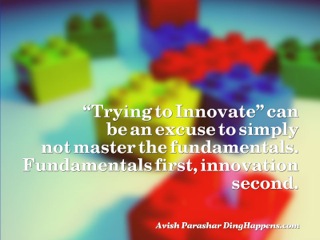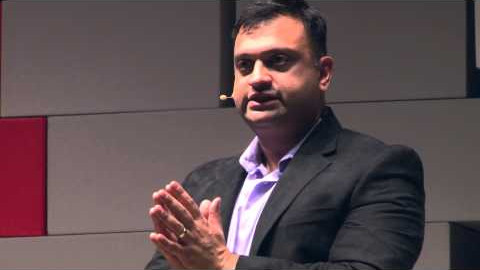Stop Wasting Your Time on Innovation…
But if you are innovating for the wrong reasons, you are simply wasting your time…
In my experience, “Trying to Innovate” can be an excuse to simply not master the fundamentals.
I taught improv comedy for years and found that many performers were always excited about learning a new game, structure, or format. They may only have been ok at the improv exercises they knew, but they really wanted to learn something new.
I also taught martial arts for years, and the same pattern emerged. A vast majority of students were very excited about learning the next technique, lock, or form, even if they were only ok at the ones they were currently working on.
In both of these examples, the people who got really good were the ones who spent lots of time and practice mastering the fundamentals.
This is not to say they never learned anything new. But by mastering the fundamentals first, they were able to learn all the new stuff faster and better than everyone else.
In fact, I cannot recall a single case of an improviser or martial artist who mastered the fundamentals and then failed to become great at their art.
In your business, organization, or life, you may feel the same seductive pull of “doing something new.”
That’s why creativity and innovation can be so exciting (at least in the early stages). There is an excitement to charting a new course, breaking new ground, and being disruptive.
However, all of that means nothing if you don’t have the fundamentals down.
Unfortunately, innovation is a tool many use to skip the hard work of mastering the fundamentals.
As strong a proponent as I am of innovation, I firmly believe that before you embark on an innovation initiative you make sure you have already mastered the fundamentals:
- You might not need an innovative new marketing campaign, you might just need to get better at basic sales skills.
- You might not need a game-changing product, you might just need to deliver better service to your existing customer base.
- You might not need to overhaul your underlying technology system, you might just need to communicate with and pay better attention to what your employees are telling you.
The “new” idea is sexy and fun and exciting. The fundamentals are what make you successful.
Take an honest look at yourself, your department, and your organization. Do you really need to be more innovative at this point or do you just need to get better at the basics?
Remember: Fundamentals First, Innovation Second.
***
Do you want to help your team, department, or organization identifying whether you need fundamentals or innovation? Contact Avish now to discuss bringing these ideas to your group!
2 Responses to “Stop Wasting Your Time on Innovation…”
Comments
Read below or add a comment...













 RSS
RSS Email
Email





Interesting post, Avish. This relates to a lot of situations in business and life.
A quick story to illustrate. This past week my daughter graduated from her elementary school. Her journey from kindergarten through fifth grade has been inspiring to me. At every stage, the focus has been on making sure that she grasps the fundamental concepts of each subject and creates a strong foundation for stepping up to the next level of mastery.
My elementary school was far different from hers. It was part of an overcrowded school district in San Jose, California. Classes of 40 or more, schools on double session, etc. More than that, my elementary school was experimenting with “The New Math”. Learning shortcuts took the place of mastering the fundamentals.
When my family moved to upstate New York I received some math tutoring over the course of my first year of middle school. It was painful and humbling. I eventually caught up to some degree but I was never more than a B student in math.
Back to my daughter’s situation, and a much happier story. My daughter is a gifted (ahem, in my humble opinion) writer. She breezed through the reading and writing portions of her elementary school curriculum. However, math was more challenging for her. Given my history, I decided that I would make sure she didn’t repeat my bad experience with math.
As it turns out, I didn’t need to worry. Her math curriculum was focused on all the right things. Her teachers took a logical, step by step approach that also made it interesting for her to master the fundamentals.
This past year, she joined the advanced math class and achieved a 95 average. She worked hard and I couldn’t be more proud of her.
An important business and life lesson was brought into focus for me via my daughter’s school experience. If you want to master an important subject or skill area, even one that doesn’t come naturally to you, it all starts with studying and mastering the fundamentals and building a strong foundation.
Thanks Steve, that is a great story. Sounds like your daughter is doing all the right things and rocking out!